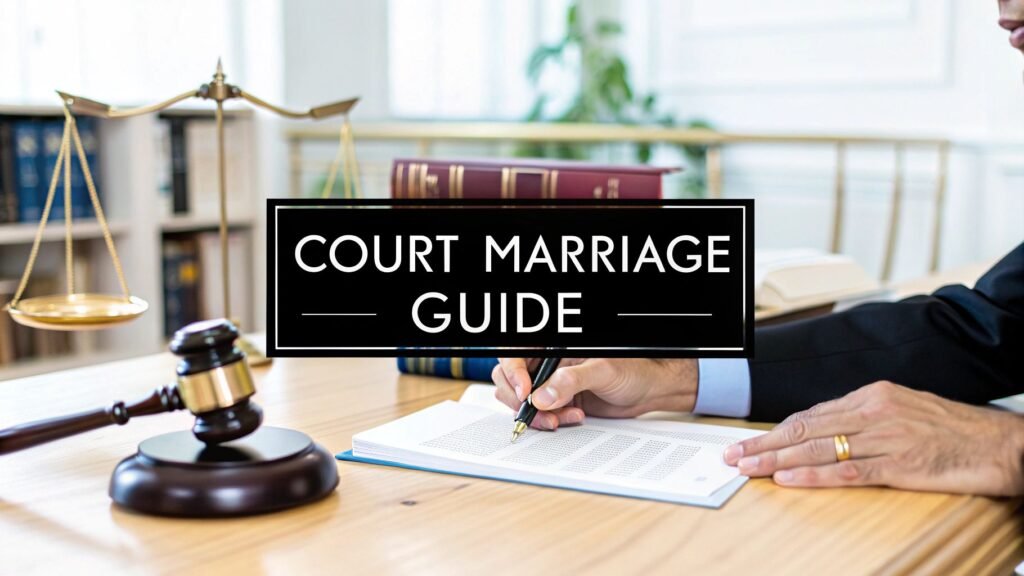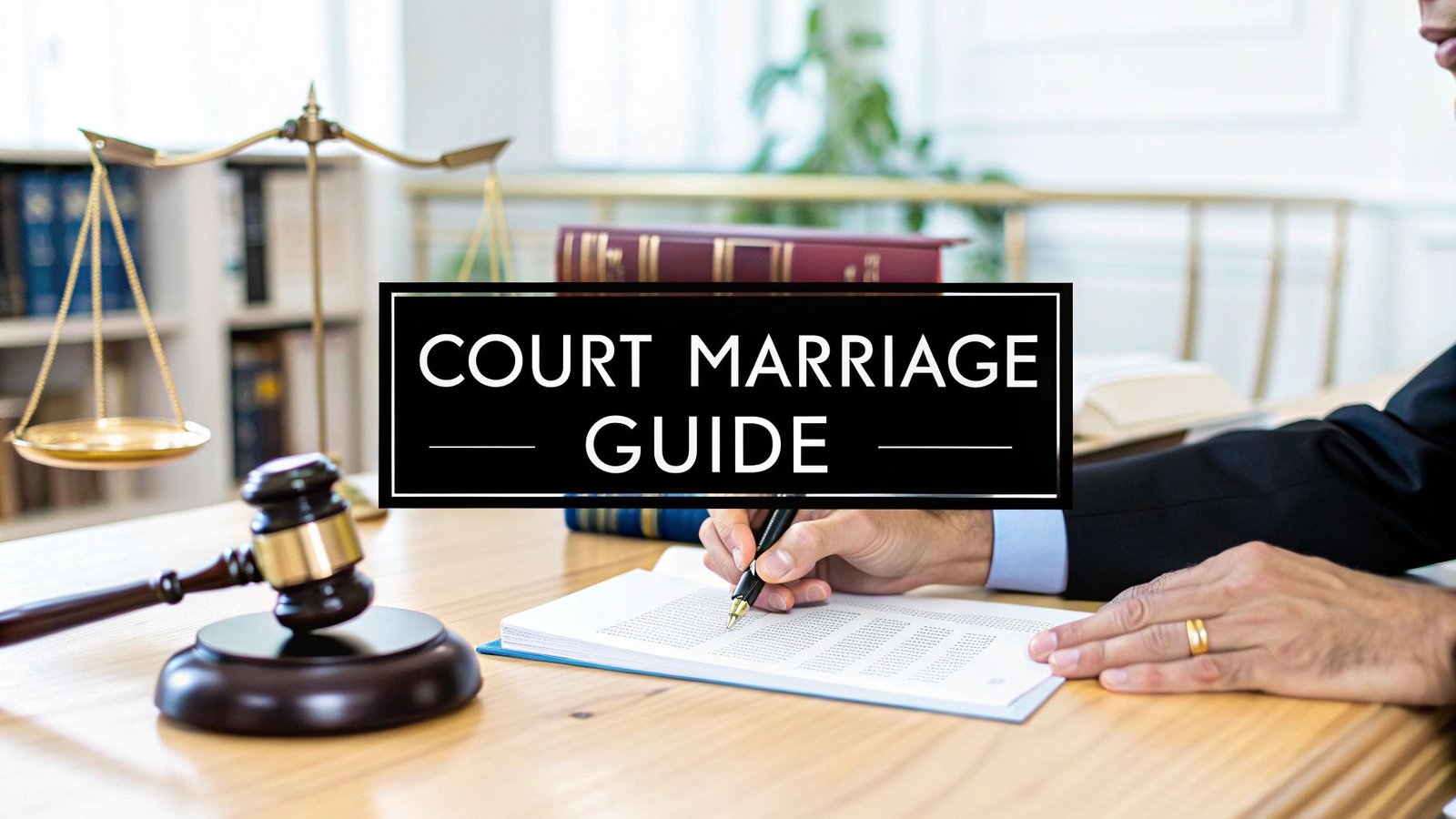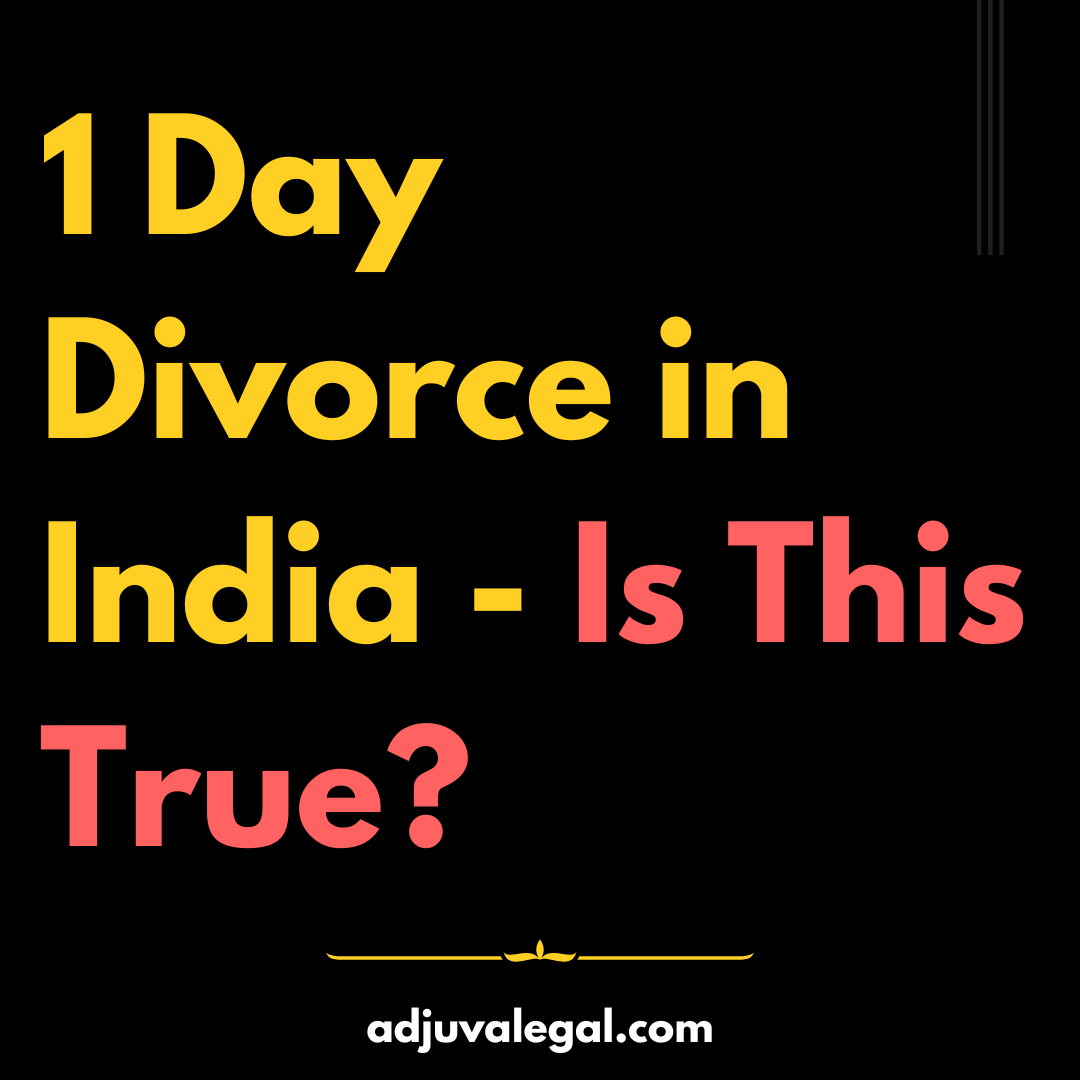So, you’re thinking about a court marriage. It’s a straightforward, legally sound way for two people to get married in India, governed by the Special Marriage Act, 1954. Unlike a traditional wedding, this is a civil ceremony that focuses purely on the legal union, without any religious rituals.
The process is clear-cut: you file a Notice of Intended Marriage, wait through a mandatory 30-day period, and then complete the final steps before a Marriage Registrar. It’s a secular path open to any couple who meets the eligibility criteria, making it a popular choice for inter-faith and inter-caste couples.
Understanding the Court Marriage Process
Choosing a court marriage means opting for a union defined by legal clarity, not religious custom. Think of it less as an alternative to a traditional wedding and more as a powerful legal framework that stands entirely on its own. It’s an empowering decision that places your partnership under the protection of the law.
This guide will walk you through the entire journey, breaking down each step into simple, actionable information. From getting your paperwork in order to holding the final certificate, we’ve got you covered.
The Key Stages
The court marriage process is methodical, designed to ensure everything is transparent and that both individuals are entering the marriage by their own free will. It all kicks off with a formal declaration, not a grand ceremony.
Here’s what you can expect to navigate:
- Filing the Notice: Your first official move. You and your partner will submit a formal notice to the Marriage Registrar, declaring your intention to marry.
- The Waiting Period: Once the notice is filed, a mandatory 30-day waiting period begins. This allows time for the notice to be public and for anyone with a valid legal objection to come forward.
- Verification and Solemnisation: After the 30 days are up and there are no objections, you’ll visit the registrar’s office. Your documents will be verified, and the marriage will be finalised in the presence of your witnesses.
To give you a clearer picture of the timeline, here’s a quick breakdown of how these stages fit together.
Quick Overview of the Court Marriage Process
This table summarises the main steps you’ll take, from the moment you decide to file your notice to the day you receive your marriage certificate.
| Stage Number | Action Required | Typical Duration |
|---|---|---|
| 1 | File the “Notice of Intended Marriage” with the Marriage Registrar. | 1 Day |
| 2 | The notice is published, starting the mandatory waiting period. | 30 Days |
| 3 | Attend the registrar’s office for document verification. | 1 Day |
| 4 | The marriage is solemnised in the presence of 3 witnesses. | 1 Day |
| 5 | The Marriage Certificate is issued and officially recorded. | Same Day or within a few days |
As you can see, the total time from filing the notice to getting your certificate typically ranges from 35 to 45 days, primarily due to that mandatory waiting period.
Why It’s a Solid Choice
A court marriage provides an ironclad legal foundation for your partnership. It secures crucial rights concerning inheritance, succession, and other legal matters that you simply don’t get with informal unions.
Ultimately, it puts the focus exactly where it should be: on the mutual consent of two people. This makes it a powerful statement of personal choice, ensuring your union is officially recorded, legally indisputable, and secure for the future.
Checking Your Eligibility for a Court Marriage
So, you’re thinking about a court marriage. Before you get lost in the paperwork and procedures, the very first step is to make sure you and your partner actually qualify. Think of this as the legal green light; without it, your application won’t even get off the starting block. These rules are all laid out in The Special Marriage Act, 1954, which sets the ground rules for every civil union in India.
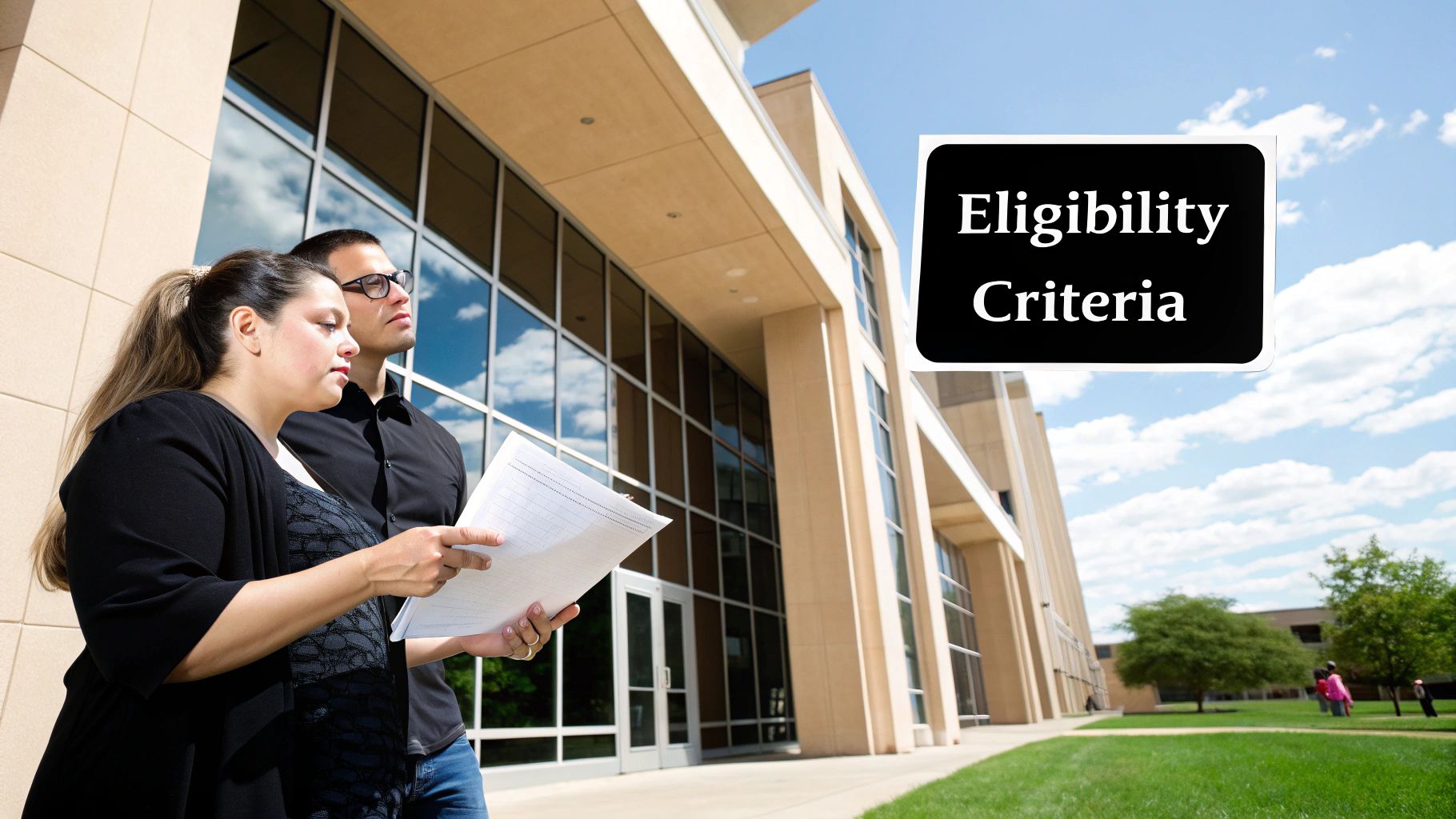
These aren’t just bureaucratic formalities. Each requirement is a safeguard, put in place to protect both you and your partner as you enter into a legally binding commitment. Let’s walk through them one by one.
Meeting the Basic Conditions
First things first, let’s cover the absolute must-haves. These are the non-negotiable points related to your age, current marital status, and mental fitness. When you submit your application, this is the very first checklist the Marriage Registrar will run through.
To get the go-ahead for a court marriage, both of you must meet these criteria:
- Marital Status: Neither of you can have a spouse who is currently living. Simply put, you must be single, widowed, or officially divorced. If you were previously married, you’ll need a formal divorce decree to prove that the union has been legally dissolved.
- Age Requirement: The groom needs to be at least 21 years old, and the bride must be at least 18 years old. This is the law of the land in India, and you’ll have to provide official documents as proof of age.
- Consent and Mental Capacity: Both partners must be of sound mind and fully capable of giving their genuine consent. This is crucial because it confirms the marriage is a choice made freely, without any pressure or mental condition that might impair your understanding of what you’re committing to.
If you can tick these three boxes, you’re in a great position. But there’s one more layer to this.
The eligibility criteria aren’t just procedural hurdles. They are legal principles that uphold the sanctity and validity of a civil union, ensuring that every marriage registered under the Special Marriage Act is consensual, legal, and binding.
Understanding Prohibited Relationships
Beyond the basics, the law also steps in to prevent marriages between people who are too closely related. This is what’s legally known as the ‘degrees of prohibited relationship’. It’s a concept designed to prevent unions between close family members, something that is restricted by both law and deep-rooted social custom.
It’s like drawing a boundary line on your family tree. The rules are quite specific about who is considered too close for marriage. For example, you cannot marry:
- A direct ancestor (like your mother or grandmother)
- A direct descendant (like your daughter or granddaughter)
- The spouse of a direct ancestor or descendant
- A sibling, or your sibling’s child (a niece or nephew)
- An uncle or aunt
It sounds simple enough, but these rules also cover relationships by adoption and half-blood connections. In some very rare cases, an exception might be allowed if a long-standing custom in your specific community permits such a marriage, but proving this is a high bar.
Making sure your relationship doesn’t fall into any of these prohibited categories is a vital final check. Ticking all these boxes ensures your path to a court marriage will be as smooth and straightforward as possible.
Gathering Your Essential Documents
Think of getting a court marriage like preparing for a big trip. You wouldn’t just show up at the airport without your passport, tickets, and visa, would you? The same logic applies here. Having all your documents perfectly in order before you even think about visiting the Marriage Registrar’s office is the secret to a smooth, hassle-free process.
This step is all about preparation, and it’s non-negotiable. It’s not just bureaucratic red tape; it’s the very foundation of your application. One missing document or a single incorrect detail can bring everything to a grinding halt, potentially forcing you to restart the entire process. Let’s walk through exactly what you, your partner, and your witnesses need to have on hand.
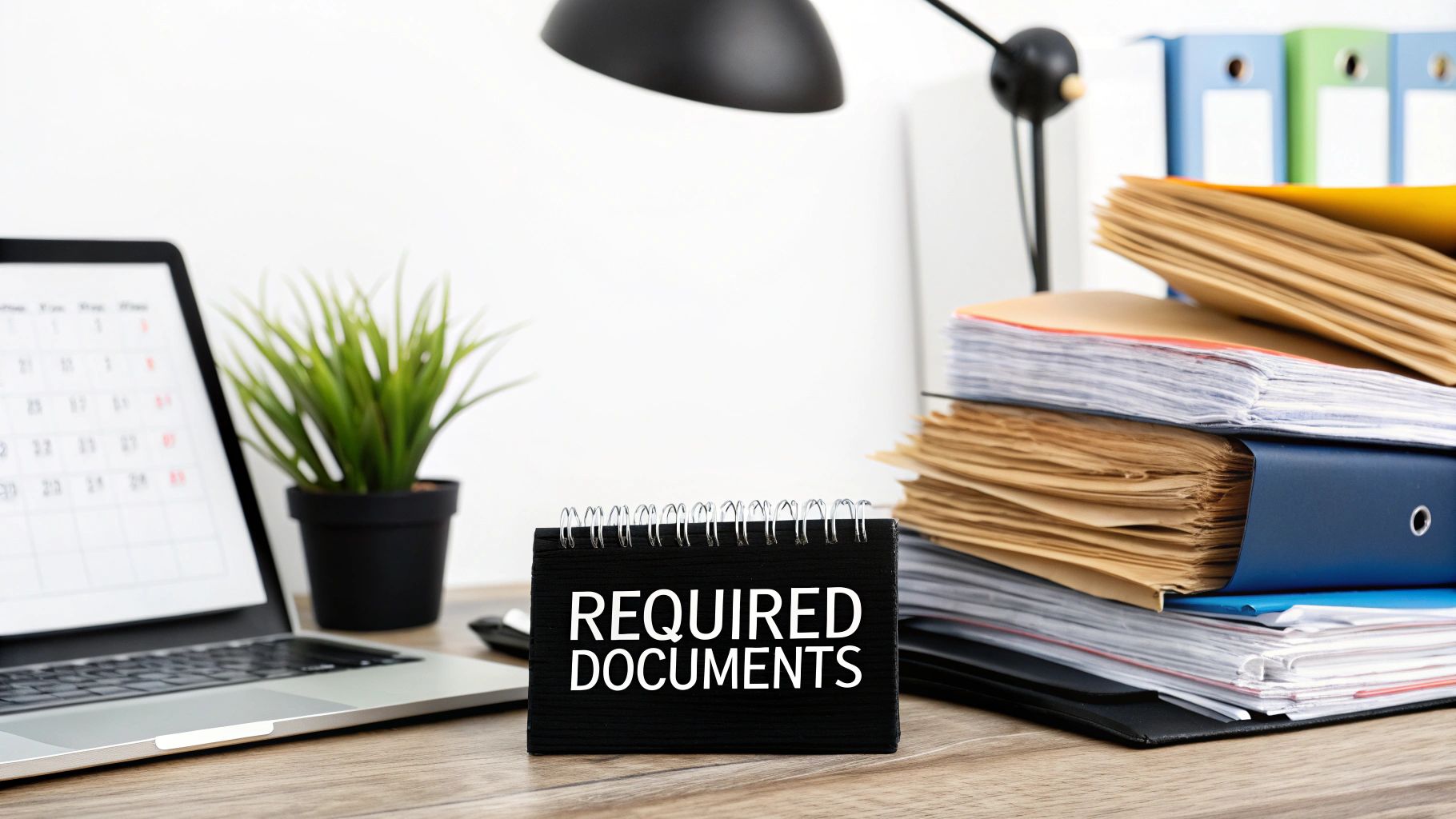
Core Documents for the Couple
For both you and your partner, the registrar needs to confirm three basic things: your identity, your age, and your address. You’ll need to bring the original documents for verification, plus photocopies that they will keep for their records.
Here’s the checklist of must-haves for both of you:
- Application Form: This is the prescribed form, which must be carefully filled out and signed by both partners.
- Proof of Date of Birth: This is critical to confirm you meet the legal age of marriage (21 for men, 18 for women). A Birth Certificate, Class 10th or 12th Mark Sheet, or your Passport will work.
- Proof of Address: You need to prove that at least one of you has lived in the registrar’s jurisdiction for at least 30 days. An Aadhaar Card, Voter ID Card, Passport, or a recent utility bill (like electricity or water) in your name is perfect.
- Passport-Sized Photographs: You will need several recent photos. It’s best to have 4-6 photographs each, but carrying a few extras is always a smart move.
- Receipt of Fees: Don’t forget the proof of payment for the application and notice fees.
Understanding what makes a document legally valid is half the battle. For a more detailed look, this guide on the top 10 legal documents for Indians can be a great resource to make sure you’re fully prepared.
Affidavits and Special Circumstances
Beyond the standard ID and address proofs, you’ll also need to provide a formal legal declaration, known as an affidavit. This is a sworn statement confirming key facts about your eligibility to marry.
Both of you must submit separate, individual affidavits stating the following:
- Your exact date of birth.
- Your current marital status (whether you are unmarried, legally divorced, or widowed).
- A declaration that you are not related to each other within the “prohibited degrees of relationship” outlined in the Special Marriage Act.
Important Note: If this isn’t your first marriage, you absolutely must provide proof that you are legally free to marry again. For someone who is divorced, a certified copy of the divorce decree is mandatory. For a widow or widower, the death certificate of the former spouse is required. Without these, your application cannot proceed.
Documents for Your Witnesses
Your witnesses aren’t just there to cheer you on; they play an official legal role. You need three witnesses to be physically present when your marriage is solemnised. They are legally attesting to your marriage, so their identity must also be properly verified.
Each of your three witnesses needs to bring:
- Proof of Identity: An Aadhaar Card or Passport works best.
- Proof of Address: Just like the couple, they’ll need something like a Voter ID or a recent utility bill.
- Passport-Sized Photographs: Each witness should have 2 recent photographs ready.
Make sure you choose reliable witnesses and remind them to bring their documents. A witness showing up with incomplete paperwork can cause the same delays as if your own documents were out of order. A little bit of methodical preparation now will save you a world of headaches later, ensuring your path to getting married is as straightforward as possible.
Navigating the Step-by-Step Procedure
So, you’ve confirmed you’re eligible and have all your paperwork in order. Fantastic. Now comes the main event: the actual court marriage process. This is where you formally declare your intention to marry, turning it into a legally recognised action.
Think of it as a journey with clear milestones. It all starts with a public notice and wraps up with the solemnisation of your marriage and that all-important certificate. Every step is carefully designed to ensure transparency, legality, and the genuine consent of both you and your partner. Let’s walk through it together, stage by stage.
Stage 1: Filing the Notice of Intended Marriage
The very first official step is to file a Notice of Intended Marriage. This is a simple, written declaration you submit to the Marriage Registrar in the district where at least one of you has lived for a minimum of 30 days just before filing. This residency rule is a big deal; you can’t just pick any district you like.
This notice contains your basic details—names, birth dates, addresses, and marital status. It’s your way of officially telling the legal system, “We’re getting married.” Once you submit it with your documents and the required fee, the wheels start turning.
The Marriage Officer will then log your notice in the Marriage Notice Book, a public record anyone can inspect. This is the starting gun for the whole process and leads straight into the most crucial waiting phase.
Stage 2: The Mandatory 30-Day Waiting Period
Once your notice is filed, the law requires a 30-day waiting period. This isn’t just bureaucratic red tape; it serves a specific legal purpose. A copy of your notice gets posted in a prominent spot at the Marriage Registrar’s office, usually on a notice board for everyone to see.
Why the public display? It gives anyone with a valid legal objection to your marriage a chance to come forward. It’s a final check to make sure all the legal boxes—like age, previous marital status, and so on—are genuinely ticked.
This 30-day window is the cornerstone of the Special Marriage Act’s due process. It ensures the marriage is conducted with full transparency, giving the community a chance to raise legitimate concerns before the union is legally finalised.
During this month, all you and your partner need to do is wait. If no one raises a valid objection, the path is clear for you to get married. But what happens if someone does?
Stage 3: Handling Objections, if They Arise
Someone can’t just object because they don’t like your choice of partner. An objection must be based on the grounds that the marriage would violate a specific condition under the Special Marriage Act. For instance, if one of you is underage, already married, or the two of you are related in a way that is legally prohibited.
If someone files a formal objection, the Marriage Officer has to look into it within 30 days. It’s a bit like a mini-inquiry where the officer hears from both sides—the person objecting and the two of you—and examines any evidence.
- If the objection is upheld: The Marriage Officer will refuse to solemnise the marriage. If this happens, you have the right to appeal the decision to the district court within 30 days.
- If the objection is dismissed: If the officer finds the objection is baseless, they’ll throw it out, and you can move forward with your marriage.
Thankfully, most objections don’t hold up, but it’s good to know how the system works. Once the 30-day notice period is over without any successful objections, you’re ready for the final, most awaited step.
This infographic simplifies the core journey, illustrating the main phases from application to certification.
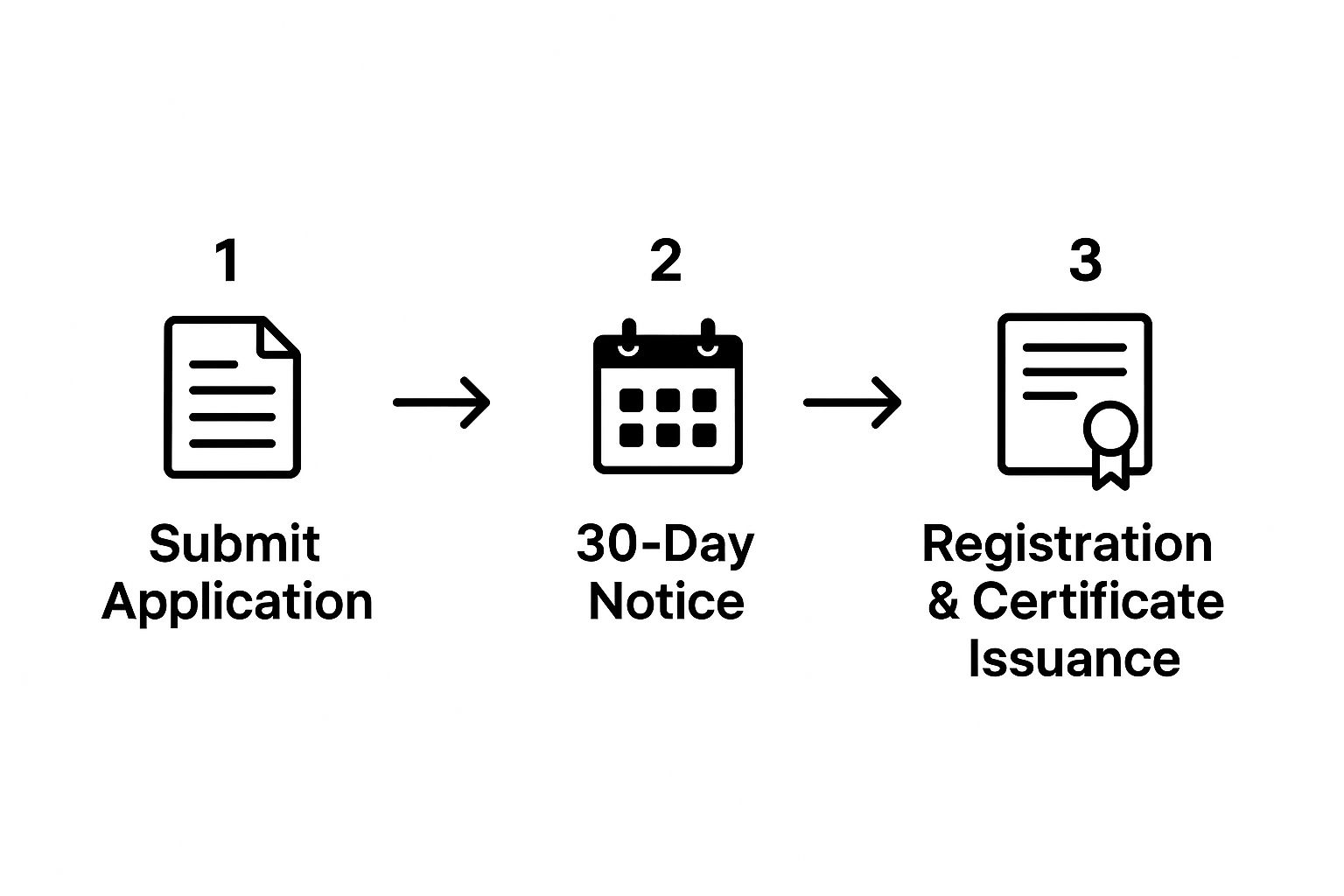
As you can see, the process flows logically from your initial submission, through that crucial notice period, and on to the final registration.
Stage 4: The Day of Solemnisation and Registration
This is it—the day your marriage becomes official! You, your partner, and your three witnesses will need to appear before the Marriage Officer. The ceremony itself is refreshingly simple and secular. The focus is purely on your legal commitment, with no religious rituals involved.
On the day, you’ll each make a simple declaration in front of the Marriage Officer and your witnesses. It’s a straightforward statement of consent:
“I, (Your Name), take thee, (Partner’s Name), to be my lawful wife/husband.”
After you both say these words, the two of you and all three witnesses will sign the Marriage Certificate. The Marriage Officer then countersigns it and adds their official seal. That signature is what makes it all legal. Your marriage is now solemnised and registered, and you’ll be handed the official Marriage Certificate—the ultimate legal proof of your new status.
The Legal and Social Impact of a Court Marriage
Deciding to have a court marriage is about much more than just the paperwork. It’s a powerful choice that speaks volumes about modern values, personal freedom, and the need for legal security. This civil union, legally backed by the Special Marriage Act, 1954, offers a solid alternative to traditional ceremonies by putting legal recognition ahead of religious rituals. For a growing number of couples in India, it represents a major shift in how marriage is viewed—one that champions individual choice above all else.
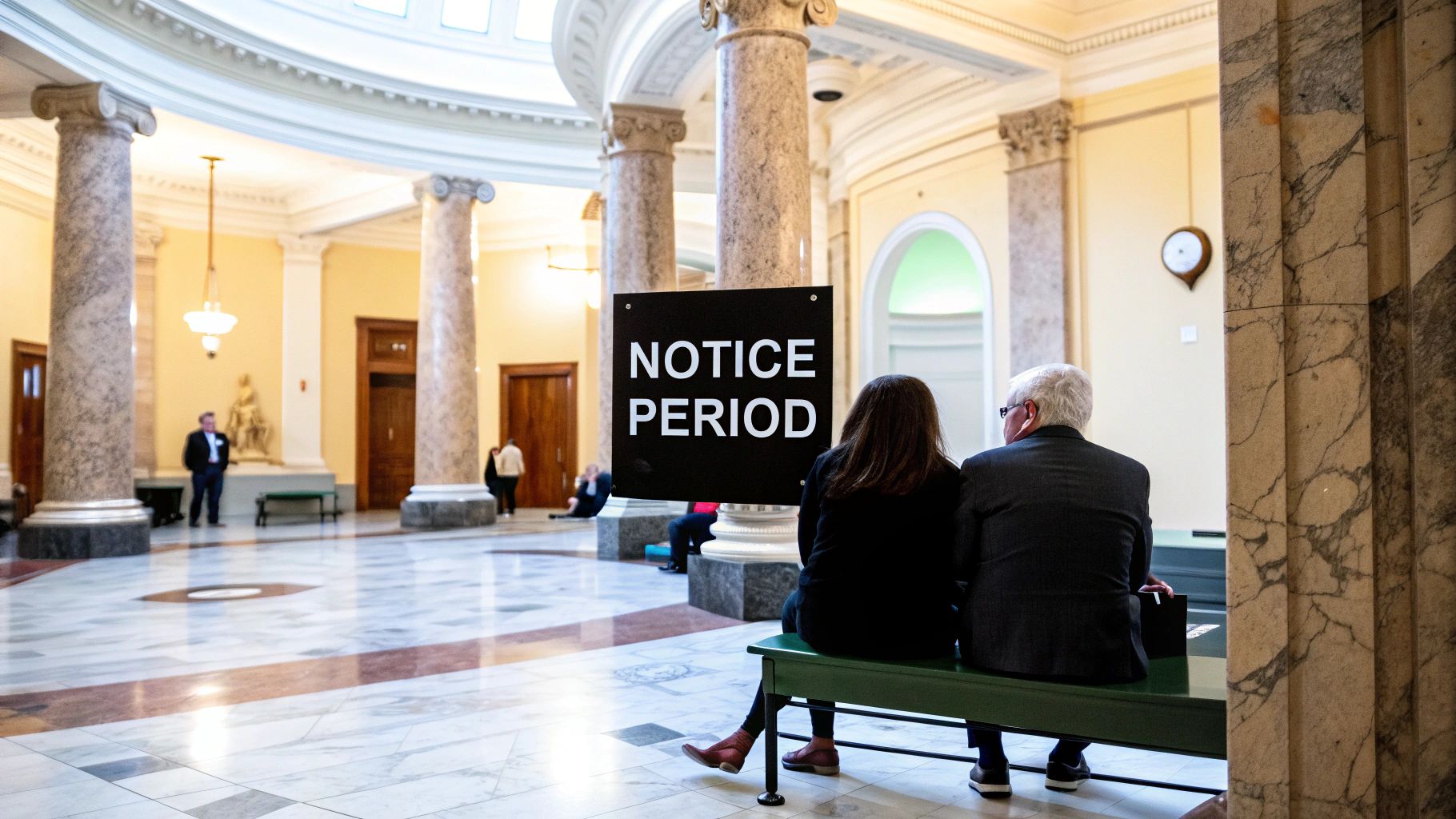
This legal route is a game-changer, especially for inter-faith and inter-caste couples. It removes the need for religious conversion or sticking to specific customs, creating a neutral ground where two people can get married based on consent alone. This legal protection is often a lifeline, shielding couples from family or societal pressure and ensuring their union is built on law, not just tradition.
A Reflection of Modernising Values
Opting for a court marriage often signals a deliberate step away from the pressure of big, expensive weddings and outdated customs like dowry. It strips everything back to what truly matters: the legal and emotional bond between two individuals. Ultimately, this choice gives couples the power to define their marriage on their own terms, free from outside noise.
The influence of this choice has been quietly growing ever since the Special Marriage Act came into force. Government data shows that by 2025, an estimated 20% of marriages in major cities like Delhi, Mumbai, and Bengaluru were registered as court marriages. What’s really telling is that over 60% of these couples said that securing their legal rights was a key reason for their decision.
The Power of a Legal Document
At its heart, a court marriage provides an ironclad legal foundation for your partnership. That marriage certificate isn’t just a piece of paper; it’s a key that unlocks a whole host of rights and protections for both spouses.
This official recognition is critical for things like:
- Inheritance and Succession Rights: It makes sure your spouse is legally seen as your heir.
- Joint Financial Matters: It smooths the way for opening joint bank accounts, getting loans, and making investments together.
- Insurance and Medical Benefits: It allows you to name your spouse as a beneficiary on policies or include them in family health plans.
- Child Custody and Adoption: It establishes a clear legal footing for parental rights and duties.
A court marriage takes a personal commitment and turns it into a legally recognised institution. It’s a safety net that protects both partners’ rights and interests, making sure your union is supported not just by love, but by the full weight of the law.
Of course, beyond the legal side of things, the strength of any marriage—court-sanctioned or not—comes down to compatibility and mutual understanding. Taking the time to explore essential compatibility questions for couples can build a really strong foundation for your future together. This is especially true when you’re taking what can be a bold step against the grain. Many couples find that the intentional, thought-out process of a court marriage actually reflects the kind of deliberate effort needed to build a lasting partnership.
For a closer look at the unique aspects of unions built on personal choice, you can read our guide on https://adjuvalegal.com/love-marriage-in-india/.
Navigating the Bumps in the Road to Your Court Marriage
Let’s be honest, any legal process can feel a bit daunting. While a court marriage is meant to be straightforward, knowing where the potential speed bumps are can save you a world of headaches. Think of it like a road trip – a little preparation goes a long way in ensuring a smooth journey.
Most of the time, the trouble comes from small, avoidable errors. A tiny mistake on an application form or a forgotten signature can bring everything to a grinding halt. Another common pitfall is filing the notice in the wrong place. Remember, the law is very specific: at least one of you must have lived in the district for 30 days before you can file there. Double-checking that you’re at the right Marriage Registrar’s office is the first step to success.
What Happens if Someone Objects?
That 30-day notice period isn’t just a waiting game; it’s a window for legal objections. But—and this is a big but—someone can’t just object because they don’t like your choice of partner. The objection has to be based on solid legal grounds outlined in the Special Marriage Act.
So, what counts as a valid objection?
- Underage: One of you is younger than the legal age (18 for women, 21 for men).
- Already Married: One of you is still legally married to someone else.
- Prohibited Degrees: The two of you are related in a way that the law doesn’t permit for marriage.
If an objection is raised, don’t panic. The Marriage Officer is required to look into it. Your job is to stay calm and present all your documents and proof clearly. Frivolous or personal objections are usually dismissed pretty quickly. The best defence is a good offence: make absolutely certain you meet every single eligibility requirement before you even start.
Handling Delays and Outside Pressures
Beyond the official paperwork, you might run into other hurdles. Government offices can sometimes move at their own pace, leading to administrative delays. If the 30-day period passes and you haven’t heard anything, a polite follow-up call or visit is perfectly acceptable. Just be sure to keep copies of all your application documents handy for quick reference.
Your biggest ally in this process is the law itself. The court marriage framework is designed to protect your right to marry who you choose, offering a secular and legally sound path, no matter what anyone else thinks.
Finally, dealing with family or social pressure can be emotionally draining. It’s important to remember that as consenting adults, this is your legally protected right. Leaning on supportive friends and choosing reliable witnesses can make all the difference. By understanding the process and preparing for these potential issues, you can walk this path with confidence and a lot less stress.
Answering Your Key Questions
Alright, let’s cut through the confusion. As you plan your court marriage, a lot of questions are bound to pop up. Here are straight-up answers to some of the most common ones we hear, helping you get a clear picture of what to expect.
Can a Court Marriage Be Done in One Day?
In a word, no. It’s a common myth, but a court marriage in India simply can’t be wrapped up in a single day. The process is governed by the Special Marriage Act of 1954, which has a very specific timeline.
The law requires a mandatory 30-day notice period after you first file your “Notice of Intended Marriage.” This window is non-negotiable; it’s designed to allow time for any legal objections to be raised. Only after this 30-day period passes without any issues can you finalise the marriage. So, you’re always looking at a process that takes over a month from start to finish.
What Is the Total Fee for a Court Marriage?
The official government fees are actually quite affordable, usually ranging from ₹150 to ₹1,000. This covers the core administrative costs like filing the notice, the solemnisation ceremony itself, and issuing your official marriage certificate.
Of course, that’s just the government’s side of things. If you decide to hire a lawyer to help you navigate the paperwork and make sure everything is in order, your total cost will naturally be higher.
Is Parental Consent Required?
This is a big one for many couples. The answer is clear: parental consent is not required for a court marriage, as long as both of you are legally adults.
The minimum age is set at 21 years for men and 18 years for women. If both partners meet this age requirement and are entering the marriage of their own free will, you don’t need anyone else’s permission.
Can We Get Married in Any City?
Yes, you can get married in any district in India, but there’s a key condition you have to meet. At least one of you must have lived in that specific district for a minimum of 30 days right before you file your marriage notice.
You have to submit your application to the Marriage Registrar of the district where one of you can prove this residency. You can’t just pick a random city you like.
The rise of court marriages is changing the social fabric, especially in major cities. In hubs like Delhi, Mumbai, and Bengaluru, it’s reported that over 30% of all new marriages are now registered this way, driven by easier legal processes and shifting mindsets. This shift is also seen in the courts, with an uptick in legal cases related to these unions as more people stand up for their marital rights.
At Adjuva Legal, we simplify complex legal journeys. If you need expert guidance for your court marriage, documentation, or any other legal matter, we provide fast, transparent, and confidential support. Get started with Adjuva Legal today.

